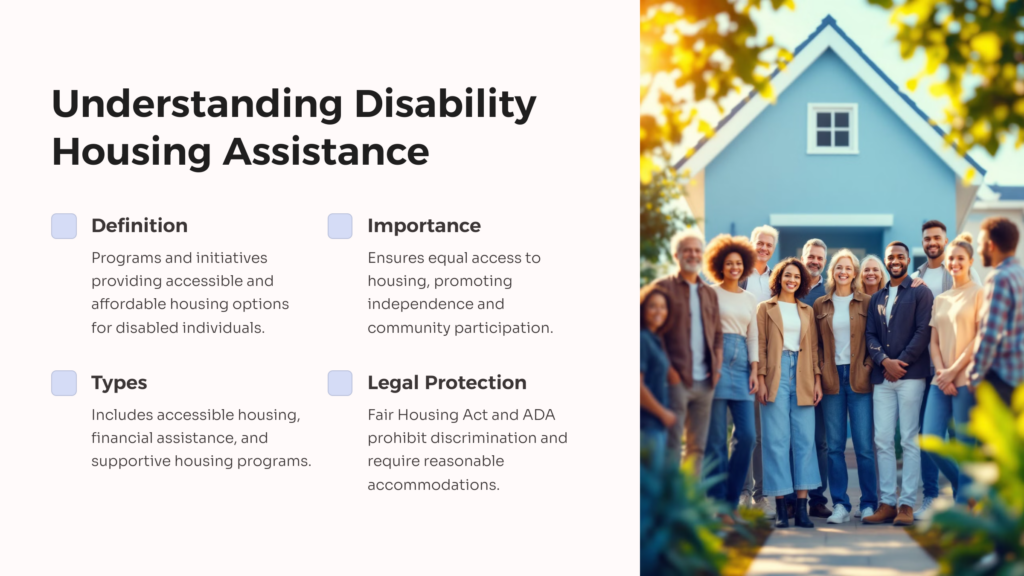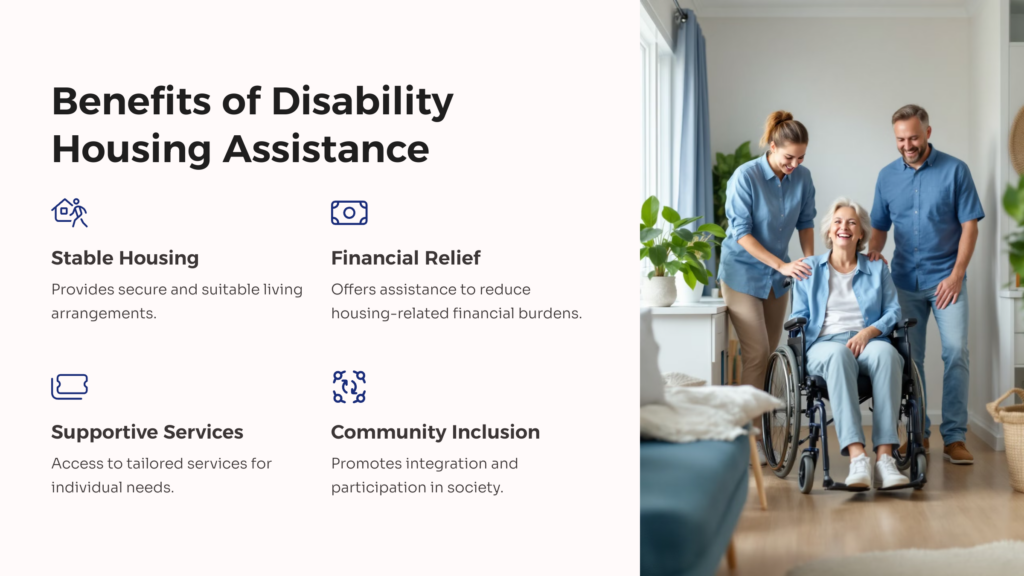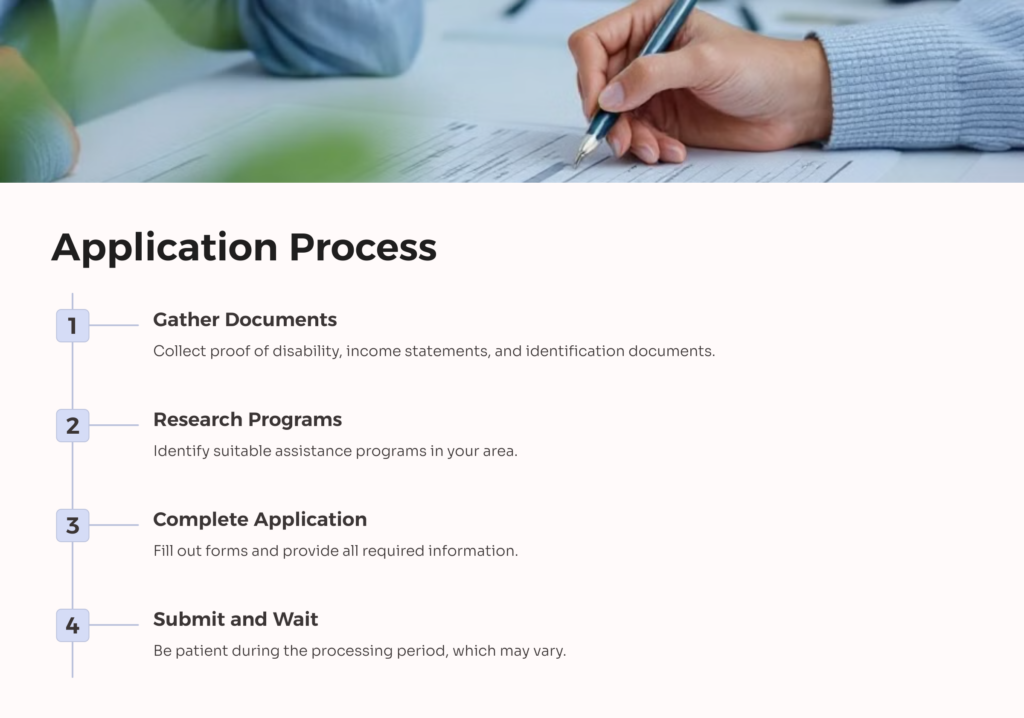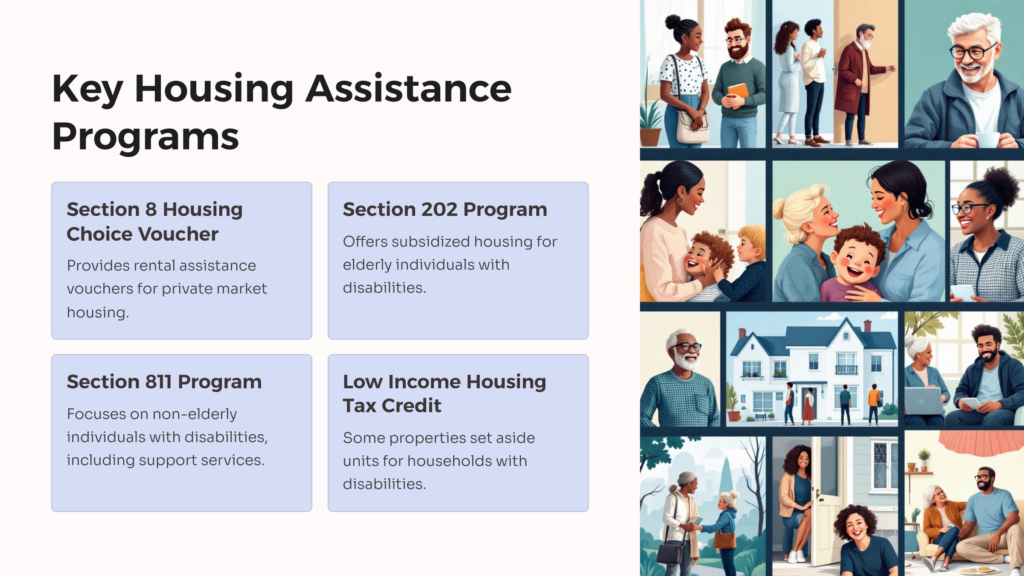For a person living with a disability, there are many unique challenges, one of which is securing suitable housing. Disability housing assistance aims to bridge this gap, offering support and resources to individuals facing physical, mental, or developmental challenges. In this article, we’ll explore the ins and outs of applying for disability housing assistance, ensuring everyone has access to safe and comfortable living arrangements.
Disability housing assistance encompasses various programs and initiatives designed to provide accessible and affordable disability housing options for individuals with disabilities. These disability housing programs may include financial aid, rental subsidies, and supportive services tailored to the needs of disabled individuals.
Accessible housing is fundamental to the well-being and independence of individuals with disabilities. It not only provides a sense of security and stability but also enables greater participation in community life and access to essential services.

What Is Disability Housing Assistance?
Disability housing assistance is a crucial aspect of ensuring equal access to housing for individuals with disabilities. It encompasses various programs, policies, and initiatives aimed at providing affordable, accessible, and supportive housing options for people with disabilities.
To navigate the application process effectively, it’s crucial to understand the fundamentals of disability housing assistance. This involves understanding its significance, exploring the different types of assistance available, and analyzing the challenges and opportunities in this field.
Why disability housing is important.
Access to suitable housing is a fundamental human right, yet individuals with disabilities often face barriers such as inaccessible infrastructure, discrimination, and financial constraints.
Disability housing assistance aims to address these barriers by providing affordable housing options that meet the unique needs of people with disabilities, enabling them to live independently and participate fully in their communities.
Accessible housing not only benefits individuals with disabilities but also promotes social inclusion, economic empowerment, and overall community well-being.
Disability housing assistance encompasses a range of programs and services aimed at improving housing accessibility and affordability for disabled individuals. These initiatives may be provided by federal, state, or local agencies, each with its own eligibility criteria and application procedures.
Types of Housing Available for Disabled Individuals
Disabled individuals may have various housing options available to them, including subsidized rental units, accessible public housing, and supportive housing communities tailored to specific disabilities.
Accessible housing.
This includes housing units designed or modified to accommodate the needs of people with disabilities, such as wheelchair ramps, wider doorways, and accessible bathrooms.
Financial assistance.
This involves subsidies, disability housing voucher programs, or disability housing grants to help individuals with disabilities afford housing, either through rental assistance programs or homeownership assistance programs.
Supportive housing
These programs not only provide affordable housing but also support services such as personal care, counseling, and community integration to help individuals with disabilities live independently.
Federal Laws Related to Housing Assistance
Several federal laws protect the rights of individuals with disabilities in the housing market, including the Fair Housing Act and the Americans with Disabilities Act. These laws prohibit discrimination based on disability and require reasonable accommodations to ensure equal access to housing.
Challenges and opportunities.
Affordability.
One of the primary challenges is the lack of affordable housing options for people with disabilities, particularly those with low incomes. Addressing this requires increased funding for housing assistance programs and the development of more affordable housing units.
Accessibility.
Despite legal requirements for accessibility, many housing units still lack basic accessibility features, posing challenges for people with disabilities. Retrofitting existing housing stock and enforcing accessibility standards are essential to improving accessibility.
Service coordination.
Providing supportive housing involves coordination between housing agencies, healthcare providers, social services, and community organizations. Streamlining service delivery and enhancing collaboration can improve outcomes for individuals with disabilities.
Housing discrimination.
Discrimination and stigma against people with disabilities persist in the housing market, hindering their access to housing. Education, enforcement of anti-discrimination laws, and advocacy efforts are needed to combat housing discrimination.
Disability housing assistance plays a vital role in ensuring housing equity and inclusion for individuals with disabilities. By addressing affordability, accessibility, and service coordination challenges, policymakers, housing agencies, and advocates can work together to create housing environments that empower people with disabilities to live independently and participate fully in their communities.
Eligibility Criteria for Disability Housing Assistance
Before applying for disability housing assistance, it’s essential to understand the eligibility requirements.
Eligibility criteria may vary depending on the specific program or initiative. However, common requirements often include proof of disability, income limitations, and citizenship or residency status.
Many disability housing assistance programs have specific age requirements, income thresholds, and definitions of disability. Applicants may need to provide medical documentation or undergo assessments to verify their eligibility.
In addition to basic eligibility criteria, some programs may have specific requirements related to household size, living arrangements, or previous housing history.
Benefits of Applying for Disability Housing Assistance

Applying for disability housing assistance offers numerous advantages for eligible individuals and their families.
Securing disability housing assistance can significantly improve quality of life by providing stable housing, financial assistance, and access to supportive services tailored to individual needs.
From increased independence and autonomy to reduced financial burden and societal inclusion, the benefits of disability housing assistance extend far beyond the individual, positively impacting communities as a whole.
Steps to Apply for Disability Housing Assistance

Navigating the application process for disability housing assistance can seem daunting, but breaking it down into manageable steps can simplify the process.
Before beginning the application process, gather all necessary documents and personal data, including proof of disability, income statements, and identification documents.
The application process may vary depending on the program or agency administering the assistance. Typically, applicants must complete an application form, provide supporting documentation, and undergo eligibility screening.
It’s essential to familiarize yourself with the specific application procedures and requirements in your state, as they may vary significantly from one jurisdiction to another.
Due to high demand and limited resources, some disability housing assistance programs may have waitlists or delays in processing applications. It’s important to be patient and persistent throughout the process.
Housing Assistance Programs for the Disabled

Several housing assistance programs cater to the needs of disabled individuals, offering a range of housing options and supportive services such as the Permanent Supportive Housing program.
Section 8 Housing Choice Voucher Program
The Section 8 disability housing program provides rental assistance vouchers to eligible low income individuals and families, allowing them to choose their housing in the private market.
While there is no specific age requirement for applicants, applicants must have incomes that fall below certain limits set by the local Public Housing Authority (PHA).
Applicants with disabilities may qualify for priority assistance, but disability status alone does not determine eligibility.
Section 202 Program: Supportive Housing for the Elderly
Designed specifically for elderly individuals with disabilities, the Section 202 program offers subsidized housing and supportive services to promote aging in place.
Applicants must be 62 years of age or older to qualify for the Section 202 Program. This requirement ensures that the program serves elderly individuals who may have specific housing and supportive service needs related to aging.
The Section 202 Program targets low income elderly individuals. Therefore, applicants must have incomes that fall below certain income limits set by HUD.
Income limits for the Section 202 Program are typically based on the area median income (AMI) and adjusted for household size. Eligibility is often restricted to individuals or households with very low incomes, which are generally defined as incomes below 50% of the AMI.
While the Section 202 Program is primarily aimed at providing housing for elderly individuals, it does not specifically require applicants to have a disability.
However, some individuals aged 62 and older may have disabilities, and the Section 202 Program can accommodate their needs by providing supportive services such as personal care assistance, transportation, and meal services.
The focus of the program is on addressing the housing and supportive service needs of elderly individuals, including those with disabilities, to help them age in place with dignity and independence.
Section 811 Program: Supportive Housing for Persons with Disabilities
The Section 811 program focuses on providing affordable and accessible housing options for non-elderly individuals with disabilities, along with wraparound support services.
Applicants must be 18 years of age or older. While there are no income limits, typically applicants must have very low incomes.
Applicants must have a qualifying disability as defined by the program, and their disability must be expected to last at least 12 months or be terminal.
Low Income Housing Tax Credit (LIHTC) Program
While not specifically targeted at individuals with disabilities, some LIHTC properties may set aside units for households with disabilities or provide accessible units.
Tenants must have incomes that fall below certain limits set by the LIHTC program, usually around 60% of the area median income. There is no specific age requirement for tenants.
Other Local and State Programs
In addition to federal programs, many states and localities offer their own disability housing assistance initiatives tailored to the needs of their communities.
FAQ: Common Questions and Concerns About Disability Housing Assistance
Can I apply for disability housing assistance if I am already receiving other forms of government aid?
Yes, eligibility for disability housing assistance is typically not affected by other forms of government assistance.
Is disability housing assistance only available for individuals with physical disabilities?
No, disability housing assistance is available to individuals with physical, mental, and developmental disabilities, provided they meet the eligibility criteria.
How long does it take to receive approval for disability housing assistance?
The processing time for disability housing assistance applications varies depending on the program and local demand but can range from a few weeks to several months.
Can I choose where I live with disability housing assistance?
Yes, many disability housing assistance programs allow participants to choose their housing in the private market, within certain guidelines and restrictions.
Navigating the process of applying for disability housing assistance can be complex, but the benefits are well worth the effort. By understanding the eligibility criteria, exploring available programs, and following the disability housing application process diligently, individuals with disabilities can secure safe, affordable, and accessible housing options.
Take the necessary steps towards applying today by taking AllVeteran.com’s ‘Get Started’ quiz.
 AllVeteran.com Advisors
AllVeteran.com Advisors
With expertise spanning local, state, and federal benefit programs, our team is dedicated to guiding individuals towards the perfect program tailored to their unique circumstances.


















